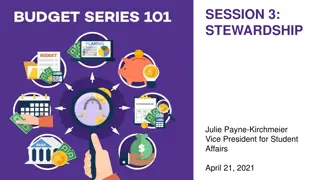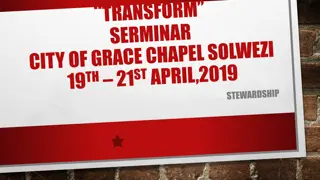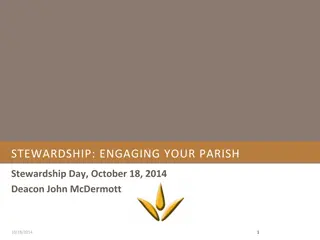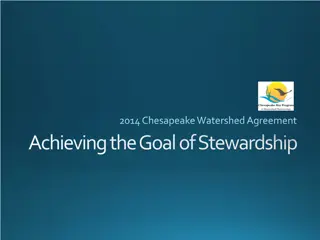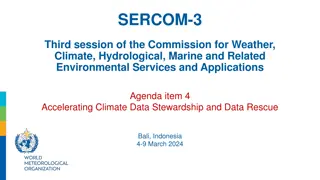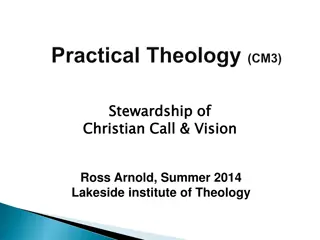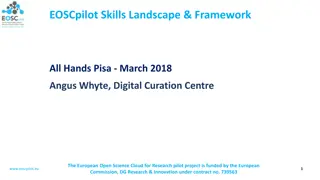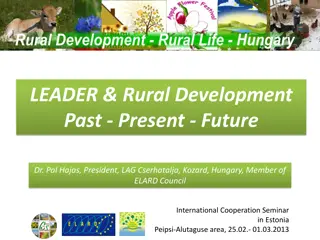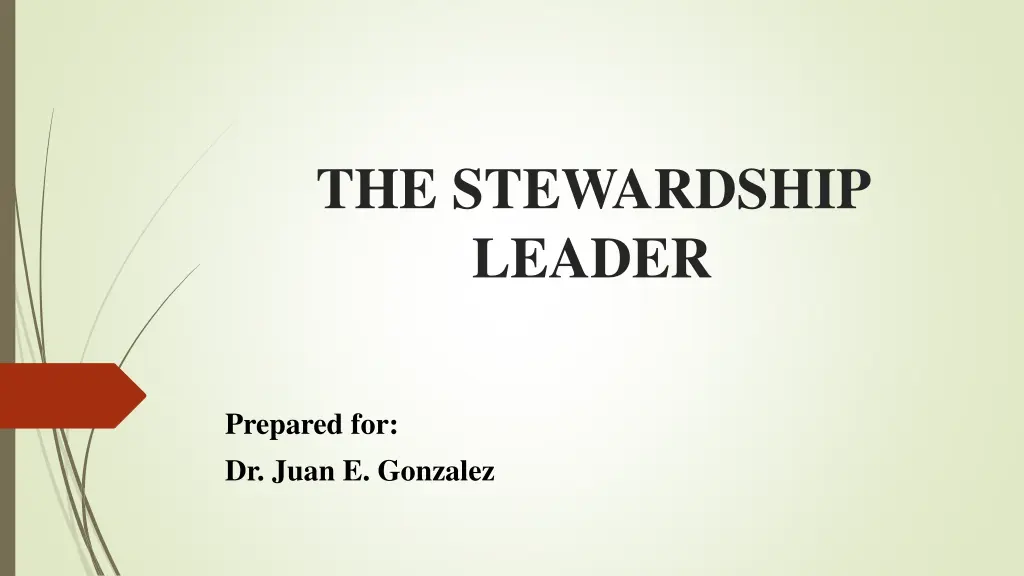
Understanding the Importance of Faithful Stewardship and Church Leadership
Explore the significance of faithful stewardship in the context of the church, as highlighted by Ellen White's teachings. Learn about the spiritual qualities expected of church leaders and the principles of stewardship. Discover the principles of stewardship in the Adventist Church and the role of the Stewardship Ministries Department in implementing these beliefs.
Download Presentation

Please find below an Image/Link to download the presentation.
The content on the website is provided AS IS for your information and personal use only. It may not be sold, licensed, or shared on other websites without obtaining consent from the author. If you encounter any issues during the download, it is possible that the publisher has removed the file from their server.
You are allowed to download the files provided on this website for personal or commercial use, subject to the condition that they are used lawfully. All files are the property of their respective owners.
The content on the website is provided AS IS for your information and personal use only. It may not be sold, licensed, or shared on other websites without obtaining consent from the author.
E N D
Presentation Transcript
THE STEWARDSHIP LEADER Prepared for: Dr. Juan E. Gonzalez
THE IMPORTANCE OF FAITHFUL STEWARDSHIP The importance of faithful stewardship is confirmed by Ellen White s inspired counsel: Every man has been made a steward of sacred trusts; each is to discharge his trust according to the direction of the Giver; and by each an account of his stewardship must be rendered to God. Ellen White has also revealed to God s church that stewardship is an important aspect of the great controversy. She reports a conversation between Satan and his angels:
We must keep in our ranks all the means of which we can gain control. The more means the followers of Christ devote to His service, the more will they injure our kingdom by getting our subjects. . . . Make covetousness and love of earthly treasures the ruling traits of their character. As long as these traits rule, salvation and grace stand back. Crowd every attraction around them, and they will be surely ours. And not only are we sure of them, but their hateful influence will not be exercised to lead others to heaven. When any shall attempt to give, put within them a grudging disposition, that it may be sparingly. [2]
The Adventist Church has adopted a fundamental belief on stewardship: We are God s stewards, entrusted by Him with time and opportunities, abilities and possessions, and the blessings of the earth and its resources. We are responsible to Him for their proper use. We acknowledge God s ownership by faithful service to Him and our fellow human beings and by returning tithe and giving offerings for the proclamation of His gospel and the support and growth of His church. Stewardship is a privilege given to us by God for nurture in love and the victory over selfishness and covetousness. . . . (Gen. 1:26-28; 2:15; 1 Chron. 29:14; Haggai 1:3-11; Mal. 3:8- 12; 1 Cor. 9:9-14; Matt. 23:23; 2 Cor. 8:1-15; 9:7; Rom. 15:26, 27).3
The Stewardship Ministries Department considers that the task of the local church stewardship director consists of the implementation of the above fundamental belief by inviting members to trust God as Owner and Provider, and to partner in His final mission through regular and systematic giving. 4Nevertheless, it is not always a straightforward task to translate this belief into programs, initiatives, and actions.
SPIRITUAL QUALITIES OF CHURCH LEADERS A person with a consistent prayer life. A faithful student of the Bible, Spirit of Prophecy, and Sabbath School lesson. Someone the church acknowledges as living according to biblical stewardship principles. This last quality is in line with the instructions of the Church Manual: By faithfully returning tithe, elders do much to encourage other members to return a faithful tithe. Elders can foster tithing by public presentation of the scriptural privilege and responsibility of stewardship and by personal labor with members in a tactful and helpful manner. 5
KNOWLEDGE AND SKILL Scriptural foundation of the broad stewardship belief. Fundamentals of personal financial management. Principles of tithing and regular and systematic offerings, called promise, based on the Bible and the Spirit of Prophecy. Proper use of tithes and offerings in the Adventist Church. Accountability and transparency in the management of church finances.
WHAT IS MY RESPONSIBILITY? The question most frequently asked by potential stewardship directors is: What does a local church stewardship director do? In response many have received the assurance that someone will explain what is expected from them when the time is right. Unfortunately, this promise is often not kept. It s not necessarily an issue of forgetfulness or neglect.
Often there is a real gap in knowledge, making it difficult for pastors and church elders to guide newly elected local church stewardship directors in their new role. And yet this information is crucial to the effective promotion of stewardship in any church congregation.
KEY RESPONSABILITIES 1. To educate the church concerning systematic benevolence. 2. To equip believers in the management of personal financial resources. 3. To participate in the administration of the local church.
In addition, though they are usually not privy to information about the personal giving of members, they closely monitor the participation trend in tithing and regular offerings for the local church. In consultation with the church leadership, they will constantly seek to improve measures of faithfulness.
STRATEGIES TO UPLIFT GENEROSITY AND FAITHFULNESS Lead people to faithfulness by pointing them to, and personally demonstrating, the love of Christ. Refrain from using guilt to lead people to faithfulness. Refrain from encouraging people to enter in a bargaining relationship with God (i.e., give to receive more). Not only preaching about what is required, but also about how to live the life of a steward. Spend time in teaching people personally and answering their unique questions.
STEWARDSHIP PROGRAMS Five aspects need utmost consideration when local directors decide on stewardship programs for their local churches:
RELEVANCY Not all good programs are good for a specific local church. What works well in one locality may not produce the same results elsewhere. The local church director needs the wisdom to decide if a given program can be adapted, or simply put aside for one that is more appropriate. Three elements help for the test of relevancy: (1) a thorough knowledge of the profile and needs of the members, (2) probing the interest of members in the program, and (3) consultation with other church leaders.
EASE OF IMPLEMENTATION Any program requires human resources for its implementation. Some stewardship education programs require unique expertise not available to a local church. Trying to implement these programs may do a disservice to the department and result in embarrassment. Self-awareness is an important characteristic of a local church stewardship director.
COST FOR IMPLEMENTATION Churches have varied financial profiles, and all programs come with a cost. It is essential that the stewardship director pays attention to the advice of Jesus in Luke 14:28: Suppose one of you wants to build a tower. Won t you first sit down and estimate the cost to see if you have enough money to complete it? (NIV). It would be quite embarrassing if the stewardship director is the one going over the allocated budget.
AVAILABLE TIME IN THE CHURCH S AGENDA It is uncommon to find an Adventist church that has free time slots for new programs. All ministries of the church are usually competing for space on the calendar. Sabbath hours are the most coveted. This situation may result in brutal competition and animosity within the church community. Stewardship ministries rarely has the best assets or arguments to win this contest.
ATTENDEES Having the expertise, the financial resources, and the time slot do not guarantee success. Another paramount obstacle is the audience. Stewardship does not have a natural audience, as children s ministries, family life ministries, youth ministries, or women s ministries does.
Many well-planned and -executed stewardship programs are poorly attended, and as a result do not reach the expected objectives. Most of the attendees are those who are already aware and convinced of stewardship principles. It s easy for the director to get frustrated and discouraged. As a result, after several underperforming programs, stewardship ministries can become a dormant ministry in the local church.
MISSION STORIES Encourage the Sabbath School team to make use of the mission story as a means of promoting weekly offerings collected during Sabbath School time. The weekly mission story reading is a regular reminder of the relationship that exists between progress in mission and giving. It is available in various formats and languages on the Adventist Mission website of the General Conference. (https://www.adventistmission.org/)
THE DIVINE SERVICE SERMON Sabbath services represent the prime time of church life. It is essential that members receive stewardship instruction during this special time. It is recommended to have a stewardship sermon, at least, once a quarter. The sermon can be presented for the pastor or the stewardship director or another leader.
WORKING AS A TEAM Adopting the undercover approach helps to address the five challenges raised above. It consists of sharing stewardship education through already-existing programs and channels of the church. The undercover strategy is more easily implemented when the stewardship leaders: Cultivate a spirit of partnership, shy away from the silo mentality, don t worry about who gets the credit.
Stand-alone Stewardship meetings are usually poorly attended. Hence, for the stewardship message to reach the church, it is important to partner with other departments. Whenever there is an opportunity, make it a priority to teach about the management of personal and family finances and the practice of regular and systematic offerings, called promise, and tithe.
WORLD STEWARDSHIP SABBATH The world church calendar provides for a World Stewardship Sabbath on the first Sabbath of December. Materials are usually available at the local conference or through adventiststewardship.org. They generally consist of a stewardship sermon and a presentation for the Sabbath afternoon. The content and date can be adapted for relevance to any context.
STEWARDSHIP REVIVAL WEEK It usually starts with the World Stewardship Day. This week has three major purposes: refreshing the mind of members about stewardship teachings, consolidating stewardship through visitations, and leading members to renew their commitment to embrace the stewardship lifestyle.
OTHER RESPONSIBILITIES Local church stewardship directors are members of the church board, and as such participate in the general management of the local church. Their role is to:
Encourage the local church leaders to set an example of faithfulness in stewardship principles and practices. Regularly share a report and an analysis of members participation in tithe and offerings. Promote the importance of building trust through transparency and accountability in the management of church resources. Advise about the proper use of tithe and offerings. Warn about the trap of substituting fund-raising gimmicks for God s plan of systematic benevolence.
VISITATION COMMITTEE Visitation is key in members spiritual nurture. It complements the public teaching of biblical principles, especially stewardship. Several aspects of stewardship education are sensitive and can be addressed effectively and confidentially only in the home setting.
THE STEWARDSHIP DIRECTOR CAN ASSIST IN: Encourage your local church to set up a visitation committee that will coordinate the systematic visitation of members. Choose to be part of the visitation team of your church. Provide a stewardship Bible study to those involved in visitation for use during the systematic visits of members. Encourage those who have access to information pertaining to the faithfulness of members concerning tithe and regular offerings to engage in stewardship-specific visitations when necessary.
FINANCE COMMITTEE The finance committee is a body set up by the church board to assist in the management of church financial resources. The stewardship director is a member of this committee.
HE/SHE ASSISTS IN THESE FIVE AREAS: An approved annual budget. An adequate internal control system for the management of resources. Clear and regular communication to all members about church finances. Respect for the adopted guidelines concerning the use of tithe. Respect for the adopted guidelines concerning the distribution of offerings.
CONCLUSION Local church stewardship directors play a key role in building a culture of faithfulness in the local church. Their ministry contributes largely to members participation in God s final mission. There is a special blessing for those who faithfully execute this responsibility.
ACCESSIBLE RESOURCES The book Counsels on Stewardship, by E. G. White, and its study guide. (https://m.egwwritings.org/en/book/22/toc) (https://m.egwwritings.org/en/book/14019.2#0) The book Stewardship Roots, by Angel Rodr guez, provides a thorough biblical understanding of the theology of tithe and offerings. (https://stewardship.adventist.org/stewardship-roots-tithing-in-the-old-testament.pdf) The book Faith & Finance provides broad insights about the management of personal finances. (https://www.amazon.com/Faith-Finance-Financial-Planning-Factor/dp/0971113475) Dynamic Steward, the quarterly magazine produced by the Stewardship Ministries of the General Conference. (https://stewardship.adventist.org/dynamic-steward-... 4- languages) Stewardship Ministries Newsletter, the monthly publication of the Stewardship Ministries of the General Conference. (https://stewardship.adventist.org/newsletter) The Adventist Stewardship website to access existing and new resources. (https://stewardship.adventist.org/) The Seventh-day Adventist Church Manual to familiarize with the administrative procedures of the department and of the church in general. (https://www.adventist.org/resources/church-manual/) Authors: Liywalii, Jallah & Barbe.
BIBLIOGRAPHY [1] Ellen G. White, Counsels to Writers and Editors (Nashville: Southern Pub. Assn., 1946), p. 162, https://m.egwwritings.org/en/book/24.114/toc. [2] Ellen G. White, Early Writings (Washington, DC: Review and Herald Pub. Assn., 1882, 1945), pp. 266, 267, https://m.egwwritings.org/en/book/22/toc. Pub. Assn., 2016), p. 169, https://www.adventist.org/wp- content/uploads/2019/06/seventh-day-adventist-church- manual_2015_updated.pdf. Orientation, https://stewardship.adventist.org/strategic-orientation- 2020-2025-(pdf).pdf, accessed Jan. 13, 2022. https://stewardship.adventist.org/the-local-church-stewardship- director? 3Seventh-day Adventist Church Manual (Nampa, Idaho: Pacific Press 4 Stewardship Ministries Strategic 5Church Manual, p. 75.

